Feb 07, 2026
Feb 07, 2026
The 1960s – Golden Years – Part 14
Laudable Films (1965-1967) Continued
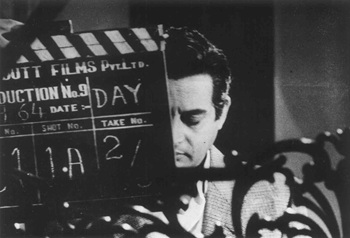 Guru Dutt launched Baharen Phir Bhi Ayengi in 1961 with himself in the lead and SD Burman as music director. The film, written by Abrar Alvi and directed by Shaheed Lateef, relates the story of a love triangle involving two sisters, the elder of whom is the hero’s employer. It is an adaptation of New Theatres KL Saigal’s film President (1937), directed by Nitin Bose. KL Saigal’s songs Ek Raja ka beta lekar udne wala ghoda and Ek bangla bane nyara from President are among my favourites.
Guru Dutt launched Baharen Phir Bhi Ayengi in 1961 with himself in the lead and SD Burman as music director. The film, written by Abrar Alvi and directed by Shaheed Lateef, relates the story of a love triangle involving two sisters, the elder of whom is the hero’s employer. It is an adaptation of New Theatres KL Saigal’s film President (1937), directed by Nitin Bose. KL Saigal’s songs Ek Raja ka beta lekar udne wala ghoda and Ek bangla bane nyara from President are among my favourites.
When SD Burman suffered a heart attack in 1961, he had already composed five songs and recorded one song for Baharen Phir Bhi Aayengi. SD Burman and his wife told Guru Dutt that their son RD Burman could get the songs recorded, but Guru Dutt refused to wait and replaced SD Burman with OP Nayyar. He also dropped the song already recorded by SD Burman. The song, which was recorded in Mohammed Rafi's voice, was later re-recorded in the voice of Kishore Kumar as Yeh dil na hota bechara for Jewel Thief (1967)
Guru Dutt was found dead in his bed on 10 October 1964. His death was suspected to be a suicide, because he had attempted suicide twice earlier, but could have been an accidental overdose of sleeping pills in an inebriated state. Abrar Alvi was with him late at night to discuss aspects of Baharen Phir Bhi Ayengi and had no inkling of impending disaster. Guru Dutt was involved in two other projects, Picnic, starring Sadhana, and director K. Asif's epic, Love and God. Picnic remained incomplete, and Love and God was released two decades later with Sanjeev Kumar in the leading role.
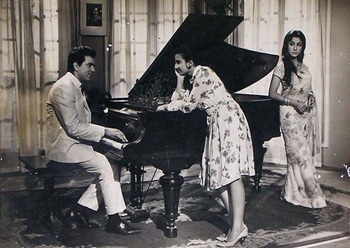 Baharen Phir Bhi Ayengi had to be reshot with Dharmendra replacing Guru Dutt and could be released only in 1966. Of the tunes composed by OP Nayyar, my favourite song is Mohammed Rafi’s, Aapke haseen rukh pe. Mahendra Kapoor’s solo, Badal jaaye agar maali, and Asha Bhonsle’s solos, Koi kehde zamane se jaake and Woh hanske mile hamse< are also good songs.
Baharen Phir Bhi Ayengi had to be reshot with Dharmendra replacing Guru Dutt and could be released only in 1966. Of the tunes composed by OP Nayyar, my favourite song is Mohammed Rafi’s, Aapke haseen rukh pe. Mahendra Kapoor’s solo, Badal jaaye agar maali, and Asha Bhonsle’s solos, Koi kehde zamane se jaake and Woh hanske mile hamse< are also good songs.
Bibi Aur Makan, produced by Hemant Kumar and directed by Hrishikesh Mukherjee, was a comedy starring Biswajit Chatterjee, Mehmood, and Keshto Mukherjee, with music by Hemant Kumar. The film is an adaptation of Sailesh Dey's Bengali play Joymakali Boarding. In much of the film, Biswajit and Keshto Mukherjee appear in drag. The proceedings begin with Biswajit recording a song in a dual voice, Kishore Kumar singing the Hindi version of his comedy song Singh nahin tobu from Lukochuri. It was a precursor of the comedies of Hrishikesh Mukherjee we came to love later. The screenplay and direction are superb. All the actors perform well, particularly Mehmood, who is the sutradhar of the story, often speaking in Bhojpuri. Hemant Kumar’s music and Gulzar’s lyrics suit the theme admirably, although none of the songs is memorable.
Devar, directed by Mohan Sehgal, starring Dharmendra, Sharmila Tagore, Deven Verma, and Shashikala. The music is by Roshan and the lyrics by Anand Bakshi. Based on Tara Shankar Bandyopadhyay’s Bengali story Naa, it is a story of love, deception, and misunderstandings. Well directed by Mohan Sehgal, it was critically acclaimed. Dharmendra, Sharmila Tagore, Deven Verma, and Shashikala gave good performances. It was the only film in which Deven Verma appeared in a negative role. Baharon ne mera chaman lootkar sung by Mukesh is a memorable song.
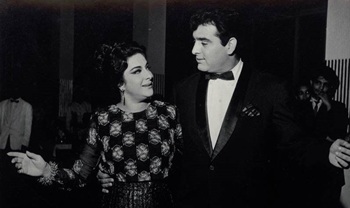 Raat Aur Din is an offbeat film about a woman with a split personality. Produced by Jaffer Hussain and directed by Satyen Bose, the film stars Nargis, Pradeep Kumar, and Feroze Khan, with Shankar Jaikishan providing the music. The film was delayed for several years because the producer lacked funds. To save money, Jaffer Hussain recalled his sister Nargis from retirement to play the lead role. This was the last appearance of Nargis in a film.
Raat Aur Din is an offbeat film about a woman with a split personality. Produced by Jaffer Hussain and directed by Satyen Bose, the film stars Nargis, Pradeep Kumar, and Feroze Khan, with Shankar Jaikishan providing the music. The film was delayed for several years because the producer lacked funds. To save money, Jaffer Hussain recalled his sister Nargis from retirement to play the lead role. This was the last appearance of Nargis in a film.
The existence of dual personalities in humans was well known. Based on this phenomenon, Robert Louis Stephenson wrote The Strange Case of Dr Jekyll and Mr Hyde in 1903. Film adaptations in talkies that followed include a 1931 version with Frederick March playing the lead role and winning the Academy Award for Best Actor, and a 1941 version with Spencer Tracy. However, the psychological reason for such behaviour remained indistinct until 1954 when clinical psychologists Corbett H Thigpen and Hervey M Checkley published a research article on their patient 'Eve' documenting the case of multiple personality, now known as dissociative identity disorder. It was later published as a popular publication titled The Three Faces of Eve in 1957. It was filmed in the same year to capitalize on public interest in multiple personalities. Joanne Woodward won the American Academy Award for Best Actress for her role in the film. Satyen Bose adapted the idea of multiple personality to Indian conditions, reducing the number of personalities to two. Baruna Varma is a typical Hindu housewife in Calcutta, who gets transformed into a party girl at night, calling herself Peggy, smoking, singing, and dancing with strangers in an avant-garde joint. Nargis’s acting is excellent, changing from Peggy to Baruna and back again, effortlessly, using her expressive eyes effectively. Nargis won the National Film Award for Best Actress for her role. Raat aur din diya jale sung separately by Mukesh and Lata Mangeshkar, and Manna Dey and Lata Mangeshkar’s duet Dil ki girah khol do are memorable songs.
Naunihal, produced by Sawan Kumar Tak and directed by Raj Mabros, is another offbeat film in a different way. In the film, the focus is on an orphan, who, like the youngster in Raj Kapoor’s Ab Dilli Door Nahin, wants to travel to Delhi to meet the Prime Minister, Jawaharlal Nehru, not to get justice for his father, as in Ab Dilli Door Nahin, but because he has been led to believe that Chacha Nehru is his only relative. Visiting his village hit by an epidemic, the principal (Balraj Sahni) of a school discovers that his family has perished in it, but finds a young boy, Raju, the only survivor in the boy’s family. He takes the child home and enrolls him in school. Teacher Uma (Indrani Mukherjee) finds him clever and mentors him. Seeing the relatives of the other children and taunted by his peers, the child, distraught at having no kin, often gets involved in fights. To calm him, the principal tells him that Chacha Nehru is his uncle and explains to him that Chacha cannot visit him because he has much to do as the country’s Prime Minister. Raju writes to Nehru and gets a reply, and learning that Nehru is visiting Bombay, travels to Bombay without telling the Principal or Uma. In Bombay, befriended by an eccentric old man (Harindranath Chattopadhyay), Raju goes to Chowpatty but reaches there only after Nehru has left. Raju is captured by a child snatcher who runs a gang of beggars and forces him to beg. Escaping from his clutches, Raju manages to take a train, helped on the way by a series of do-gooders. A benefactor in Delhi informs the Principal and Uma, who rush to Delhi. Together, they go to meet Nehru, but instead, end up attending his funeral. Several well-known actors appear as the do-gooders. Sanjeev Kumar appears briefly as Uma’s boyfriend. Madan Mohan’s music left a lasting tribute to Nehru, penned by Kaifi Azmi, Meri aawaz suno, sung by Mohammed Rafi. Tumhari zulf ki saye mein sham kar loonga, another solo by Mohammed Rafi was also popular. It is a well-made film that did moderately well at the box office. However, Raju seemed to be too ignorant and gullible. School children of his age knew more about Nehru than shown in Naunihal.
Referring to Raju writing to Nehru and getting a reply, a modern-day reviewer writes, “surprise, surprise! That letter, sent to Nehru, actually receives a reply.” In these days of high security, minimum direct contact with people and chamchagiri, it is hard to believe that a Prime Minister would attend to such communications. But those days were indeed different, and Nehru was a different kind of Prime Minister. He was known to stay up late to answer correspondence. This was no cheap PR stunt. I can vouch for that. My father-in-law, who was Headmaster of a school in Nagarjuna Sagar in the 1950s, wrote to Nehru on an inland letter to wish him on Nehru’s birthday. He got a reply on the Prime Minister’s letterhead, in Nehru’s own handwriting. When my wife and I visited the school many years later, we saw the letter displayed in the Headmaster’s Office. I captured it on my video camera.
Entertainers (1965-67)
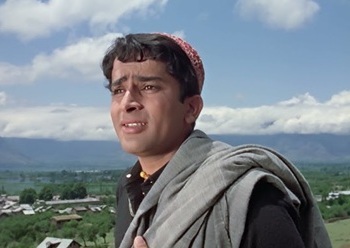 Jab Jab Phool Khile, directed by Suraj Prakash, is the story of a Kashmiri boatman who falls in love with a rich tourist, starring Shashi Kapoor and Nanda. The songs composed by Kalyanji Anandji are a highlight of the film. Jab Jab Phool Khile was the first megahit for Kalyanji Anandji as well as for lyricist Anand Bakshi. Nanda was already a star by then, and it was considered gracious of her to accept Shashi Kapoor as her co-star. Although his previous film Waqt was a hit, the focus was on Raaj Kumar and Sunil Dutt, with Shashi Kapoor only in a supporting role. Jab Jab Phool Khile made a star of Shashi Kapoor. Shashi Kapoor worked hard on his role, spending time with the boatmen in Kashmir to study their lifestyle. Neither the director nor his lead actor expected the film to run for more than 25 weeks, but the film ran for 50 weeks and celebrated a golden jubilee. The film and Shashi Kapoor became very popular in North African countries. It was said that shopkeepers in Marrakesh gave a discount to Indian tourists as people from the land of Shashi Kapoor. The climax, during which the hero pulls the heroine into the train, was shot at the Bombay Central station so realistically that director Suraj Prakash closed his eyes, convinced that Nanda's end had come. Kalyanji-Anandji gave several melodious songs, like Ye samaa samaa hai pyar ka, sung by Lata Mangeshkar, Mohammed Rafi’s solos, Affoo khudaya, and Ek tha gul aur ek thi bulbul, a duet by Mohammed Rafi and Suman Kalyanpur, Na na karte pyar tumhin se, and Pardesiyon se na ankhiyan milana, sung separately, by both Mohammed Rafi and Lata Mangeshkar.
Jab Jab Phool Khile, directed by Suraj Prakash, is the story of a Kashmiri boatman who falls in love with a rich tourist, starring Shashi Kapoor and Nanda. The songs composed by Kalyanji Anandji are a highlight of the film. Jab Jab Phool Khile was the first megahit for Kalyanji Anandji as well as for lyricist Anand Bakshi. Nanda was already a star by then, and it was considered gracious of her to accept Shashi Kapoor as her co-star. Although his previous film Waqt was a hit, the focus was on Raaj Kumar and Sunil Dutt, with Shashi Kapoor only in a supporting role. Jab Jab Phool Khile made a star of Shashi Kapoor. Shashi Kapoor worked hard on his role, spending time with the boatmen in Kashmir to study their lifestyle. Neither the director nor his lead actor expected the film to run for more than 25 weeks, but the film ran for 50 weeks and celebrated a golden jubilee. The film and Shashi Kapoor became very popular in North African countries. It was said that shopkeepers in Marrakesh gave a discount to Indian tourists as people from the land of Shashi Kapoor. The climax, during which the hero pulls the heroine into the train, was shot at the Bombay Central station so realistically that director Suraj Prakash closed his eyes, convinced that Nanda's end had come. Kalyanji-Anandji gave several melodious songs, like Ye samaa samaa hai pyar ka, sung by Lata Mangeshkar, Mohammed Rafi’s solos, Affoo khudaya, and Ek tha gul aur ek thi bulbul, a duet by Mohammed Rafi and Suman Kalyanpur, Na na karte pyar tumhin se, and Pardesiyon se na ankhiyan milana, sung separately, by both Mohammed Rafi and Lata Mangeshkar.
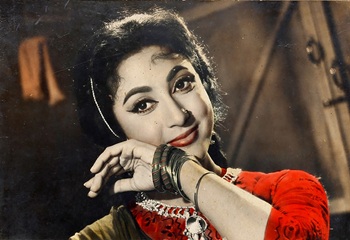 Himalay Ki God Mein, Himalay Ki God Mein, directed by Vijay Bhatt for Prakash Pictures, and starring Mala Sinha and Manoj Kumar, is a well-worn story of a romance between a city boy and a village girl from the hills. A doctor on a holiday to the Himalayan valley is kidnapped, beaten up, and abandoned. A village girl finds him, shelters him, and nurses him back to health. The film traces their troubles until their love is fulfilled.
Himalay Ki God Mein, Himalay Ki God Mein, directed by Vijay Bhatt for Prakash Pictures, and starring Mala Sinha and Manoj Kumar, is a well-worn story of a romance between a city boy and a village girl from the hills. A doctor on a holiday to the Himalayan valley is kidnapped, beaten up, and abandoned. A village girl finds him, shelters him, and nurses him back to health. The film traces their troubles until their love is fulfilled.
Kalyanji-Anandji’s music kept viewers entertained, despite many flaws in the script. Lata Mangeshkar’s solos, Oonche Himalay ke neeche, Kankariya maar ke jagaya, Ek tu na mila, and Mukesh’s Chand si mehbooba and Main to ek khwab hoon were all very popular. It was a great year for Kalyanji-Anandji with two major blockbusters. Himalay ki God Mein won the Awards for Best Film and Best Editing at the 13th Filmfare Awards. Mala Sinha was nominated for Best Actress, and Shashikala for Best Supporting Actress. Kalyanji–Anandji, lyricist Indeevar, and Lata Mangeshkar lost the Filmfare Awards for Best Music Direction and lyricist to Ravi and Rajinder Krishna, who won the Awards for Khandan.
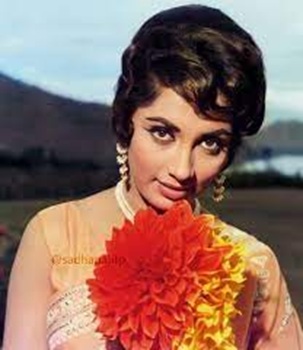 Arzoo, directed by Ramanand Sagar, starring Rajendra Kumar, Sadhana, and Feroze Khan, is the story of a love triangle. The heroine tells her lover that she dislikes physical disability in anyone, and soon afterwards, the hero becomes disabled. He stays away from her and encourages his friend to marry her, but eventually their love triumphs over life and fate. Beautiful colour photography, good direction, and acting make the film worth watching even if one does not agree with the theme. Shankar Jaikishen’s music adds value to the film. My favourite song is Lata Mangeshkar’s Aji roothkar ab kahan jayiyega. Mohammed Rafi’s solos Ae phoolon ki rani, Ae nargis-e-mastana, and Chhalke teri aankhon se, and Lata Mangeshkar’s Bedardi balma tujhko are all well-composed and well sung.
Arzoo, directed by Ramanand Sagar, starring Rajendra Kumar, Sadhana, and Feroze Khan, is the story of a love triangle. The heroine tells her lover that she dislikes physical disability in anyone, and soon afterwards, the hero becomes disabled. He stays away from her and encourages his friend to marry her, but eventually their love triumphs over life and fate. Beautiful colour photography, good direction, and acting make the film worth watching even if one does not agree with the theme. Shankar Jaikishen’s music adds value to the film. My favourite song is Lata Mangeshkar’s Aji roothkar ab kahan jayiyega. Mohammed Rafi’s solos Ae phoolon ki rani, Ae nargis-e-mastana, and Chhalke teri aankhon se, and Lata Mangeshkar’s Bedardi balma tujhko are all well-composed and well sung.
19-Jul-2025
More by : Ramarao Annavarapu

|
Great memories ! |